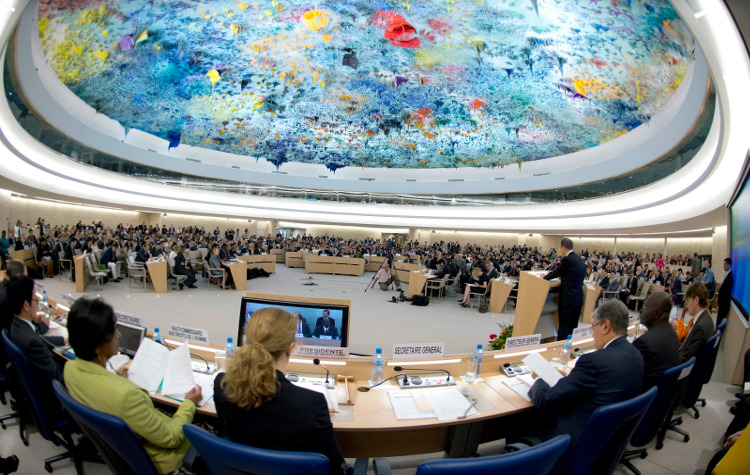FORUM-ASIA organised or co-sponsored nine side events, as well as spoke at a wrap-up side event, at the 34th session of the UN Human Rights Council. The side events include country-specific side events on Bangladesh, Burma/Myanmar, the Philippines, and Sri Lanka, and thematic side events on human rights defenders.
Backsliding on Civic Space in Democracies
Restrictions on civic space in democracies and on the work of human rights defenders, particularly in Brazil, India, Poland, and South Africa was the subject of a side event that FORUM-ASIA co-sponsored on 03 March 2017. Moderated by Mandeep Tiwana of CIVICUS, speakers were Camila Asano from Conectas, Brazil; Henri Tiphagne from Human Rights Alert, India; Maciej Kozłowski from Committee for the Defence of Democracy (KOD), Poland; Corlett Letlojane from HURISA, South Africa; and Michel Forst, Special Rapporteur on the situation of human rights defenders. According to Panelists, in Brazil, freedom of assembly and association, freedom of movement, and political participation of civil society are being repressed. In Poland, freedom of the press is systematically restricted. In South Africa, the NGO law has been amended and CSOs have been excluded from the UPR process. In India, there has been an increase in the restrictions on the functioning of civil society organisations, including restrictions on foreign funding and a law regulating NGO registrations, which has resulted in the loss of as many as 33,000 organisations. Reprisals against human rights defenders cooperating with UN mechanisms remains an issue.
The Special Rapporteur stressed the positive role of human rights defenders, which many states often do not recognise. As a result, states put in place laws that criminalise defenders. The Special Rapporteur reaffirmed his commitment to protecting human rights defenders, and called for the protection of defenders not only in the global south but also in other regions of the world.
Extrajudicial Killings in the Philippines: The War on Drugs
FORUM-ASIA co-sponsored a side event on extrajudicial killings in the Philippines together with Human Rights Watch and Amnesty International on 03 March 2017. This was moderated by John Fisher, Geneva Director of Human Rights Watch. Peter Bouckaert, Emergency Response Director of Human Rights Watch, discussed extrajudicial killings in the poorest neighbourhoods in the Philippines and the need for personal criminal liability, as well as called for an international investigation. Rachel Chhoa-Howard, Philippines Researcher of Amnesty International, discussed the report “If you are poor, you are killed”, the impact of the ‘war on drugs’ on children – and how this also has undermined the right to health – and called on the government to initiate an impartial, independent investigation. Rosanna Ocampo, UN Advocacy Programme Officer of FORUM-ASIA, discussed the lack of accountability in relation to extrajudicial killings and the deterioration of the overall human rights situation in the country, as well as called on states to use the Human Rights Council (specifically as the Philippines is currently a Council member), UPR, and other mechanisms to raise concerns. Agnes Callamard, Special Rapporteur on extrajudicial killings and executions raised some key concerns, including: the scale of the situation in a non-armed conflict; the failure to recognise the humanity of victims; and the lack of investigation.
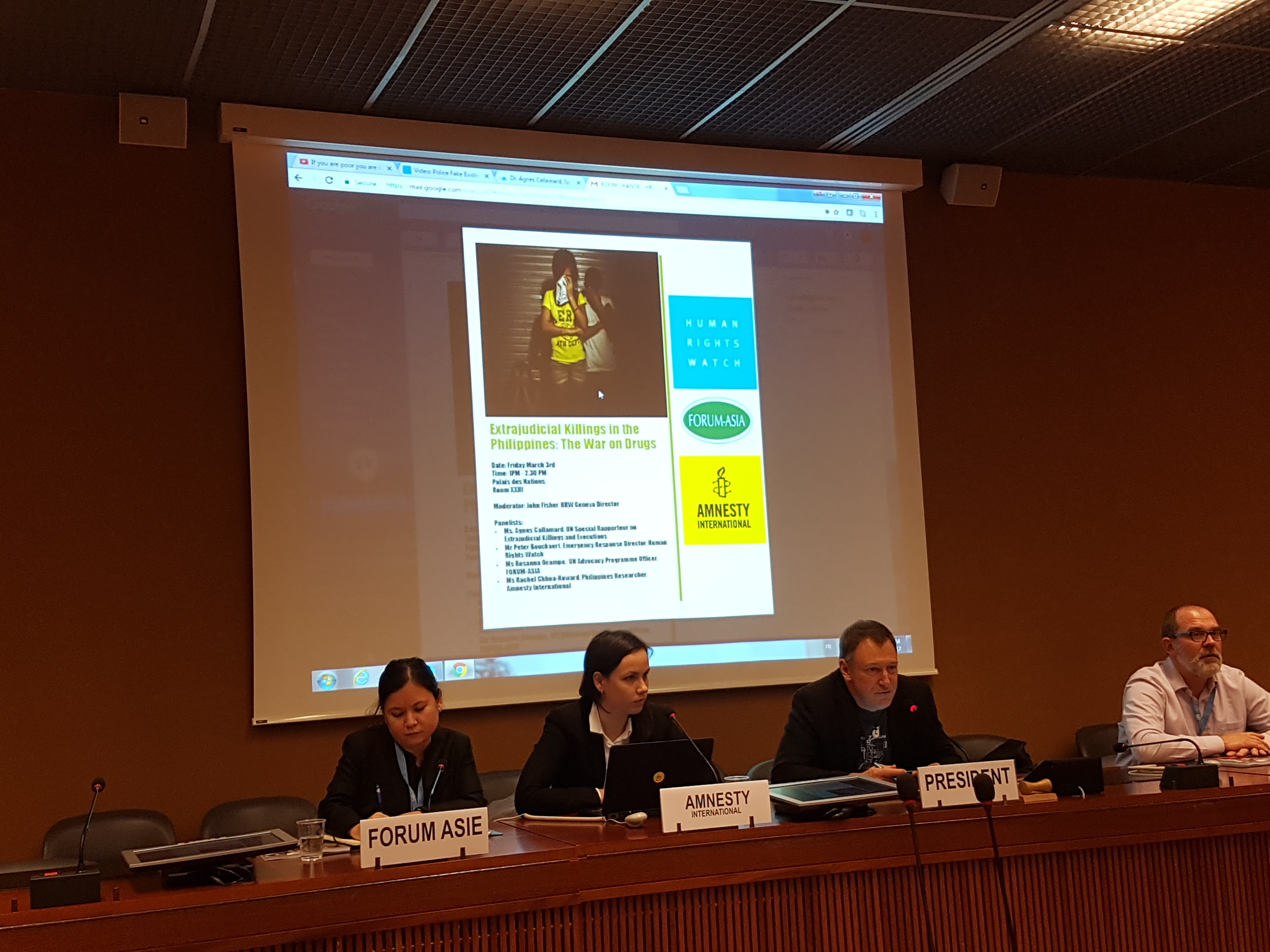
Human Rights Defence and Blogging in Bangladesh
FORUM-ASIA co-organised a side event on human rights defenders and bloggers in Bangladesh with Front Line Defenders, Association for Progressive Communication (APC) and Centre for Civil and Political Rights (CCPR Centre) on 07 March 2017. This was moderated by Gayatri Khandhadai from APC. Ahmedur Rashid Chowdhury (Tutul), a blogger, shared his experience being a victim of several attacks until October 2016. He stressed that people who work on human rights are targeted by the government and Islamic fundamentalist groups, and expressed his hope for Bangladesh to have a leader who stands for democracy and secularism. Sultana Kamal, a human rights lawyer, described state-sponsorship Islamisation that has led to the exclusion of many groups and threats against activists. Fourteen bloggers have been killed in the past few years, while free thinkers live in fear. Andrea Rocca of Frontline Defenders stated that Bangladesh has failed to protect victims nor hold perpetrators accountable, while police and state officials espouse a narrative of victim blaming. Furthermore, restrictive laws criminalise activities of the press and defenders online.
Andrea called for an investigation on attacks against human rights defenders and for perpetrators to be held to account. There is a need for a framework to protect defenders, human rights training for the police, and the amendment of communications and security laws.
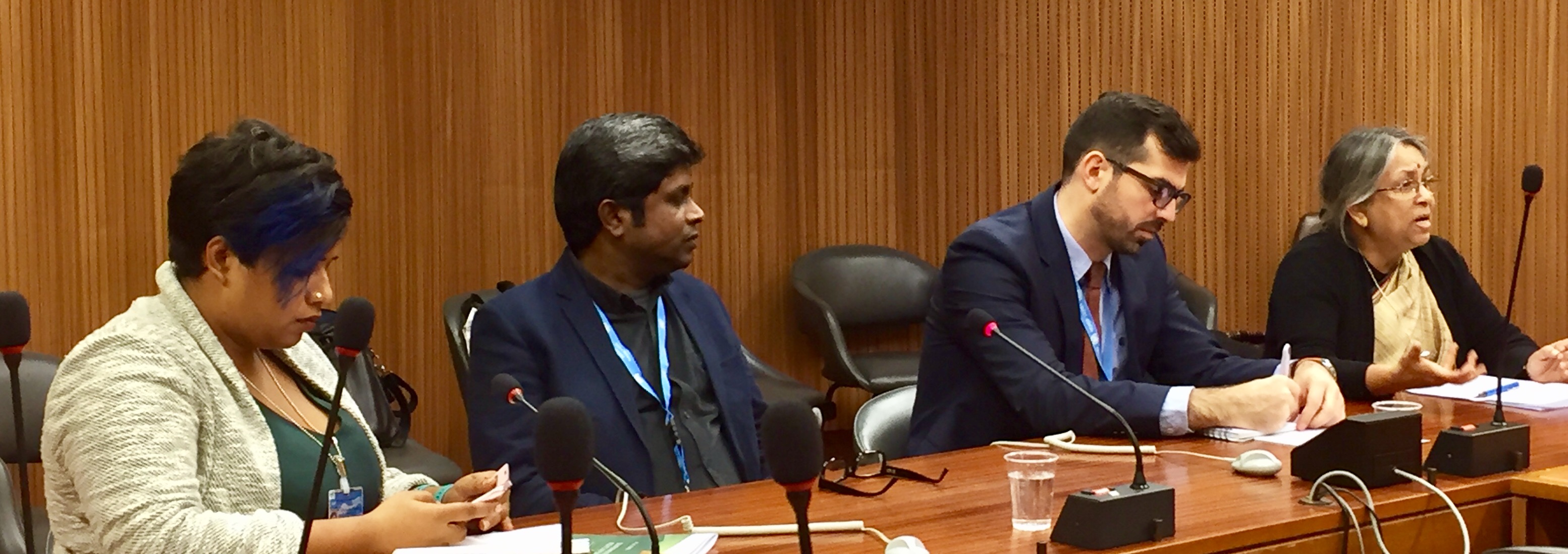
Closing the Net: Attacks on Asian Human Rights Defenders Active Online
FORUM-ASIA organised a side event on attacks on human rights defenders active online on 09 March 2017, with speakers from Bangladesh, Burma/Myanmar, Pakistan, and Thailand, and the participation of the Special Rapporteur on human rights defenders. This discussion was moderated by John Samuel of FORUM-ASIA.
Ahmedur Rashid Chowdhury, a blogger from Bangladesh reflected on the rise of religious extremism and anti-secular rhetoric in Bangladesh that led to the attacks against progressive thinkers. Khin Ohmar from Progressive Voice, Burma/Myanmar spoke of the increased legal action taken against online activists, particularly by the military and law enforcement officials. Waqass Goraya, a Pakistani blogger touched on his personal experiences of being abducted and tortured for his online activism. Amarin Saichan of the EnLAW Thai Foundation elaborated on the Thai legal framework for online defamation, specifically on the new Computer-Related Crime Act. Michel Forst, UN Special Rapporteur on human rights defenders commented on the overall trends on violations against HRDs across Asia, and the importance of giving particular consideration to youth involved in online activism.
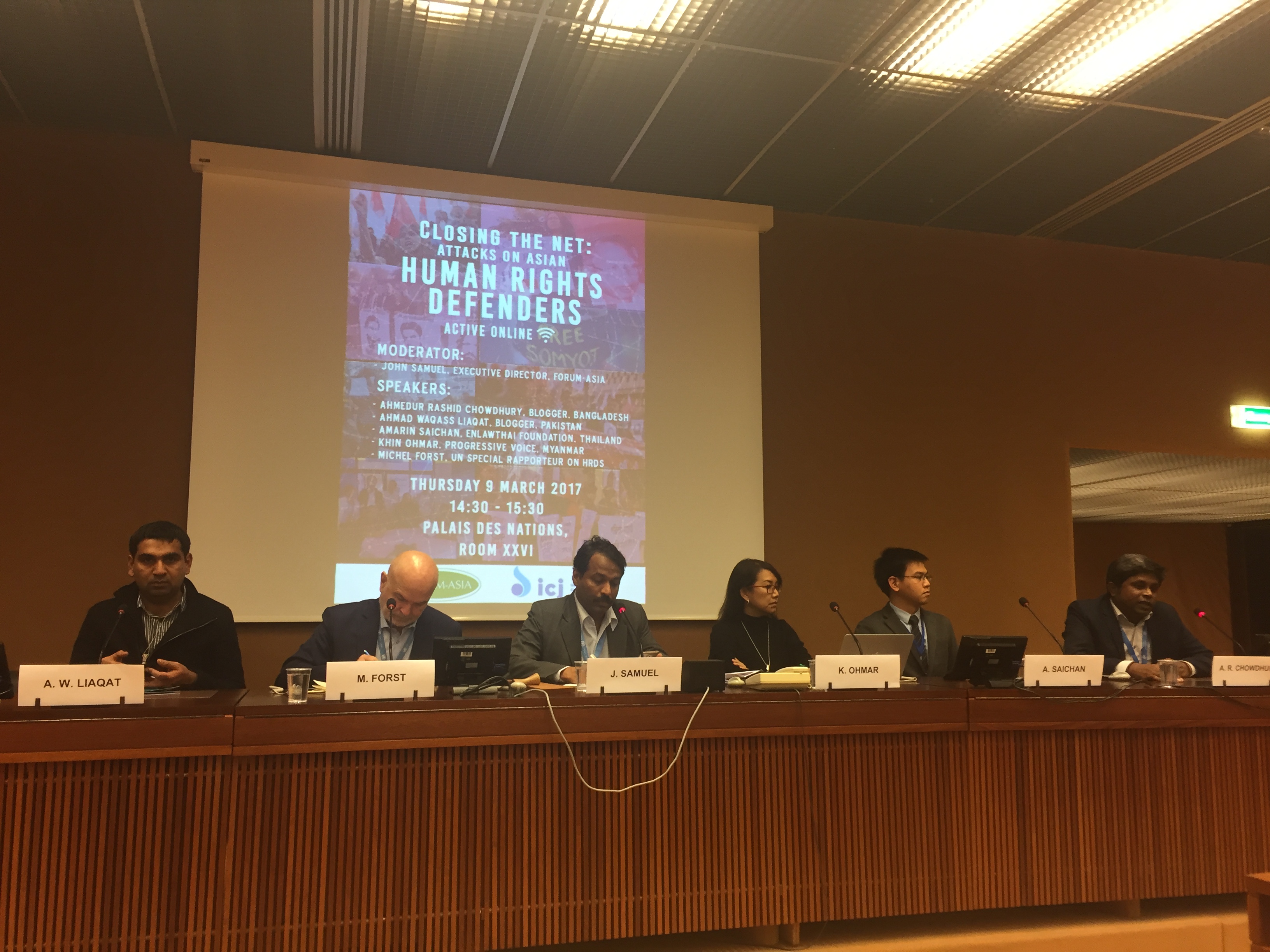
Accountability for Human Rights Violations against Rohingya
Together with Human Rights Watch and Amnesty International, FORUM-ASIA co-organised a side event on accountability for human rights violations against Rohingya on 14 March 2017. John Fisher of Human Rights Watch moderated the panel discussion.
Special Rapporteur on Myanmar, Yanghee Lee stressed that in spite of the international attention on Rakhine state, human rights violations also occur in other areas such as Kachin, Northern Shan, and Kayin states. While there is focus on the events of October 9 and its aftermath, incidents have also occurred between 2012 and 2014. She also expressed concerns of restrictions during her country visit and threats of reprisals against human rights defenders who cooperated with her.
Wai Wai Nu of Women’s Peace Network Arakan discussed human rights violations against Rohingya, including sexual violence, arbitrary arrests, and lack of access to fair trials. Domestic mechanisms have failed to bring justice to victims nor hold perpetrators accountable. She called for an international independent and impartial investigation of killings and violations committed by the security forces.
Laura Haigh, Myanmar Researcher of Amnesty International, stated that the government has denied allegations of human rights violations. Although it has established the National Commission for Investigation, this is comprised of the chief of police and former government officials, threatening the impartiality of the investigation.
Testimonies from the Ground: Conflict, Minorities, Human Rights, and Human Security in Burma/Myanmar
FORUM-ASIA organised a side event on the effects of conflict on the human rights and human security of ethnic minorities in Burma/Myanmar on 15 March 2017. Moderated by Khin Ohmar of Progressive Voice, Wai Wai Nu of Women Peace Network; Stella Naw of Kachin Women’s Organisation Thailand (KWAT); and Lway Vehnim of Ta’ang Women’s Organization comprised the panel, while Special Rapporteur on Myanmar, Yanghee Lee delivered the closing remarks.
Wai Wai Nu discussed violations against the Rohingya community in Rakhine state even before the 09 October attacks, including restrictions on freedom of movement, destruction of houses, and lack of access to food. The National Verification Card process would further marginalise the Rohingya population. The government has been actively denying allegations of these human rights violations. Lway Vehnim explained the situation of human rights following intensified military offenses in Northern Shan state. Members of the Ta’ang community have been victims of extrajudicial killings, torture, and sexual violence, and have been used as porters and human shields. There is no humanitarian assistance in the area and many have been internally displaced without proper camps in the state. Stella Naw discussed heightened violations against people living in Kachin state following indiscriminate shelling in civilian areas and increased military presence. She echoed civil society calls for a Commission of Inquiry (CoI) or similar mechanism to investigate violations of international humanitarian law and international human rights law in Rakhine, Kachin, and Northern Shan states; an end to military offensives; unhindered humanitarian access to all areas; and for an inclusive peace process based on trust.
Yanghee Lee stated the need to pay attention to the escalating violence in Kachin and Northern Shan States, in addition to the situation in Rakhine. Apart from the indiscriminate attacks on civilians, the restrictions on humanitarian access is also alarming. She stressed the need for a resolution that calls for a credible investigation and holds perpetrators to account. In wrapping up the side event, Khin Ohmar reiterated civil society calls for a CoI or some form of international investigation with a broad geographical scope and that addresses the root causes of the conflicts in Burma.

The Philippines’ Third Universal Periodic Review
Together with Misereor, Aktionsbündnis Menschenrechte – Philippinen, Franciscans International, World Council of Churches, World Organisation Against Torture (OMCT), United Evangelical Mission, and Evangelisches Werk für Diakonie und Entwicklung, FORUM-ASIA co-sponsored a side event on human rights in the Philippines in the run-up to its third Universal Periodic Review. The side event took place on 15 March 2017 and was moderated by Gerald Staberock of OMCT Geneva. Johannes Icking of Aktionsbündnis Menschenrechte – Philippinen (AMP), Cologne discussed key recommendations from the previous UPR and assessed their implementation, specifically referring to themes of extrajudicial killings, land rights, human rights defenders and journalists, and impunity. Nymia Pimentel Simbulan of PhilRights discussed the over 7,000 killings in the government’s ‘war on drugs’, the lack of accountability for these crimes, and further threats to human rights and the work of human rights defenders. Reuel Marigza of United Church of Christ in the Philippines (UCCP) discussed the harassment of human rights defenders and how extrajudicial killings are meant to create a chilling effect. Mario Maderazo of Philippine-Misereor Partnership Inc. (PMPI), Manila discussed how the various stages of mining affect human rights, particularly those of indigenous people. He made recommendations on an alternative mining bill; amending the corporation code within the framework of business and human rights; and addressing legal and practical barriers to access to justice. In the larger context of human rights, the penal code and cybercrime law need to be amended, and libel needs to be decriminalised.
Report of the Consultation Task Force and Human Rights Challenges in Sri Lanka
Together with the International Movement Against All Forms of Discrimination and Racism (IMADR), Human Rights Watch, Franciscans International, and Minority Rights Group International (MRG), FORUM-ASIA co-sponsored a side event on the findings and recommendations of the final report of the Consultation Task Force (CTF) on Reconciliation Mechanisms of Sri Lanka. The panel was moderated by J. David Whaley, a former UN resident coordinator.
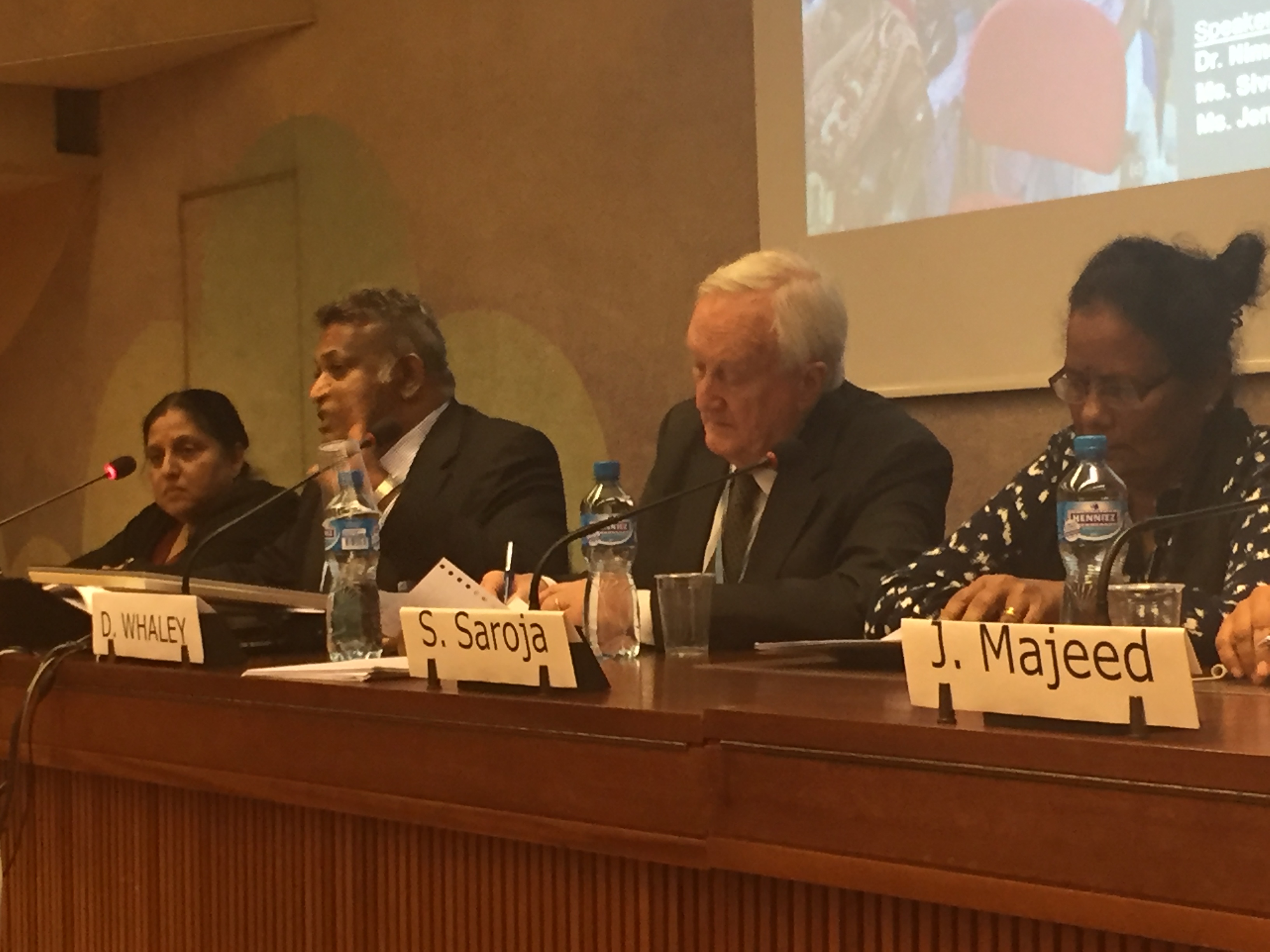
Dr Paikiasothy Saravanamuttu, former Secretary of the CTF, elaborated on the role of the CTF and the zonal task forces, in conducting island-wide public consultations on the processes and mechanisms for reconciliation in Sri Lanka. Sivachandran Saroja of the Centre for Women and Development expressed her doubts about the reconciliation process, in relation to comments made by the President claiming zero accountability for security forces. Jensila Majeed, former member of the Mullaitivu Zonal Task Force commented on the lack of representation for issues of Northern Muslims throughout the entire process of reconciliation. Nimalka Fernando of IMADR stressed the need to effectively use the space created by civil society over the next two years to ensure the implementation of robust reconciliation mechanisms as outlined in Resolution 30/1 and the CTF recommendations.
Why International Monitoring Matters: Human Rights Implementation in Sri Lanka
On 21 March 2017, FORUM-ASIA co-sponsored a side event with IMADR and Franciscans International on the importance of human rights monitoring mechanisms, specifically in the context of Sri Lanka. The panel was moderated by Matt Pollard of the International Commission of Jurists. Nimalka Fernando of IMADR discussed the implications of the future reinstatement of Sri Lanka as a beneficiary of the Generalised Scheme of Preferences (GSP+) granted by the European Union, and the human rights obligations therein that the Government of Sri Lanka is expected to uphold. She further touched on the need for a complementary, annual monitoring mechanism to ensure that these standards are upheld. In a similar vein, Barbara Lochbihler, a member of European Parliament reflected on the attitude of the European Commission and Parliament, towards Sri Lanka and its current human rights situation. The conclusion drawn by the European Commission is that there is no serious failure in the adherence to the conventions ratified by the Government of Sri Lanka. This will be disappointing for members of civil society who have highlighted the weak implementation of the provisions of UN covenants and conventions.
Ratnam Dayabaran of the Jaffna Press Club discussed the current status of the Tamil minority in the North and East of Sri Lanka and discussed the lack of accountability in relation to alleged war crimes, while calling for an international monitoring mechanism. Kumudini Wijewardana of Lanka News Web argued that an international intervention in Sri Lanka is necessary to establish democracy and reconciliation. Faaiz Ameer, lawyer and civil activist, considered the perspectives of the Muslim community towards the ongoing transitional justice process, and emphasised the need for a holistic approach aimed at addressing the grievances of all communities.
HRC 34 Wrap-Up Side Event
FORUM-ASIA spoke at a side event organised by the Conference of Non-Governmental Organizations in Consultative Relationship with the United Nations (CONGO) to wrap-up the 34th session of the UN Human Rights Council on 22 March. R. Iniyan Ilango, UN Advocacy Programme Manager of FORUM-ASIA spoke at the panel discussion together with Renate Bloem of CIVICUS, John Fisher of Human Rights Watch, Counsellor Barbara Fontana of Permanent Mission of Switzerland to the United Nations in Geneva and Radka Sibille, Human Rights Officer at Delegation of the European Union to the United Nations in Geneva.
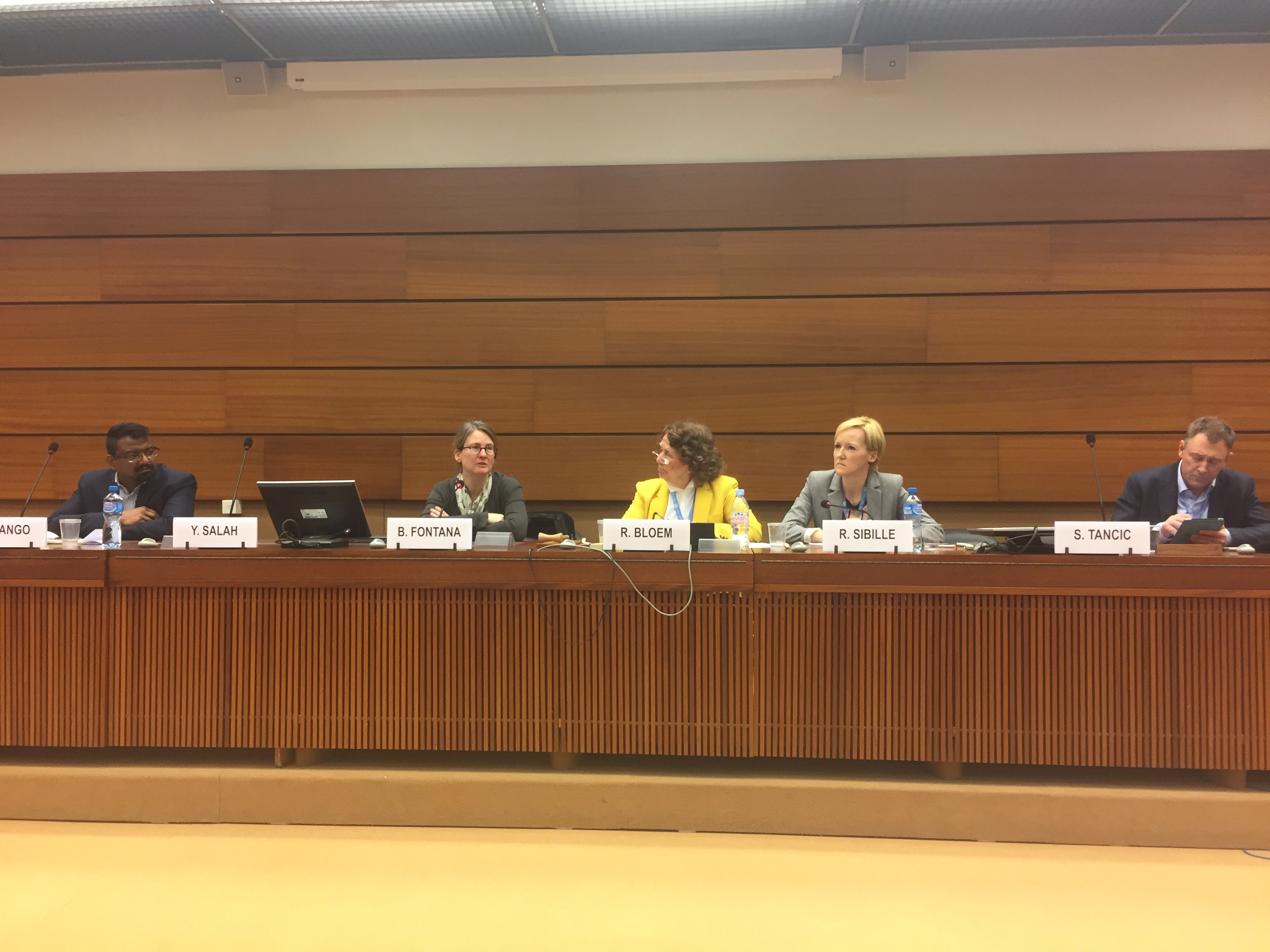
Topics discussed include country-specific resolutions followed by FORUM-ASIA this session: Myanmar and Sri Lanka. At the side event, Iniyan stated that FORUM-ASIA is pleased that the idea of benchmarks has been given more prominence over the past year. However, threats continue to core civil and political rights mandates, and civil society participation at the Council. FORUM-ASIA had hoped for more attention to Bangladesh and the Philippines this session, as well as continuity on the attention given to Cambodia in previous sessions.

